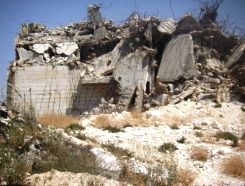By Bernhard Schell | IDN-InDepth NewsAnalysis
BRUSSELS (IDN) – Hundreds of Palestinian homes and structures have been bulldozed and approvals for illegal settlements have increased despite the 27-nation European Union (EU) asking Israel to stop settlement expansion, forced displacement, and demolition of Palestinian property in an unprecedented statement one year ago, says a new report.
EU foreign ministers adopted on May 14, 2012 some of the most extensive and far-reaching recommendations on the issue of the Israeli policies in the occupied Palestinian territory (OPT). In particular, the EU ministers approved specific recommendations for developing Area C which constitutes 60 percent of the West Bank and falls under full Israeli military and civil control. An estimated 150,000 Palestinians live there among 325,000 Israelis living in settlements that are illegal under international law.
EU foreign ministers called for improvement of Israel’s policies that are currently damaging to the development of Palestinian livelihoods and for the future viability of a Palestinian state. It also called on the Government of Israel to end impunity on settler violence, as well as allow the EU to pursue development projects in Palestinian communities without risks of Israeli demolitions. In addition, for the first time, the EU declared: “Ending the conflict was a European interest.”
In a report released on May 27, 2013, the Association of International Development Agencies (AIDA), a coordinating body representing over 80 international aid and development agencies working in the occupied Palestinian territory, have urged the EU to “match their strong words with action in order to effectively challenge Israeli government policies”.
These policies, says the report – Failing to Make the Grade: How the EU can pass its own test and work to improve the lives of Palestinians in Area C – are creating “unbearable conditions” in Area C, which is home to some of the most vulnerable Palestinian communities who are isolated from services provided by the Palestinian Authority in other parts of the West Bank. Palestinians living in that area rely heavily on humanitarian and development assistance.
According to AIDA, “chances for a just and durable solution that allows Palestinians and Israelis to live with peace and security were slipping away as the situation on the ground continues to deteriorate”.
The report points out that more than 600 houses have been built in the past year in the illegal Israeli settlements while 535 Palestinian-owned homes and structures have been destroyed, leaving 784 people homeless or displaced.
Around 30 European-funded structures have been demolished during this same time and dozens more, including basic tents, water cisterns and animal pens are under threat of demolition.
“Europe has made clear its objections to Israel’s continued settlement expansion and demolition of Palestinian and European property. Yet, its response has mostly come in words only, with action remaining on an ad hoc and uncoordinated basis,” says the report. “If this continues, living conditions for Palestinians are set to worsen, and vital European tax-payers’ investments will be wasted,” it adds.
“Just a year ago, EU governments injected fresh hope that they would collectively use their political weight to improve the living conditions of Palestinians and halt Israeli violations of international law, but looking back, we can say they are at serious risk of failing both Palestinians and Europeans,” said Charles Silva, Country Director for Action Against Hunger (ACF) and AIDA Chair.
‘Honour pledges’
The report explains what they can and must do to put their words into action that results in positive changes on the ground. It emphasises the need for Europe to “honour its pledges to increase much-needed development aid for Area C and to push the government of Israel to remove restrictions that leave Palestinians vulnerable to demolition and prevent them from building proper homes, schools, roads, water infrastructure and electrical grids”.
The report illustrates how some European countries have been working to protect communities in Area C from demolition by investing in village plans. “While the Israeli authorities are in the process of considering applications, none of the 32 European-funded village plans to date have been fully approved. This is in sharp contrast to the endering of at least 1,967 new settlement housing units in the year since the EU statement, a four-fold increase from 2011,” says the report.
It points out that Israeli government demolition of Palestinian structures typically takes place because they lack building permits, which are hard to obtain, with 94 percent of Palestinian applications for building permits denied in recent years.
“Last year EU governments said for the first time it was also in their own interest to bring an end to the conflict in Israel and Palestine – if they are serious, they can and must work together to address harmful policies of the Israeli government and support the most vulnerable Palestinians in the West Bank,” said Nishant Pandey Oxfam Country Director.
Tony Laurance, CEO from Medical Aid for Palestinians added: “Israel is morally and legally responsible for the wellbeing of Palestinian men, women and children in the occupied Palestinian territory. EU countries have an obligation to address violations of International Law and collectively to put pressure on Israel to end policies impeding Palestinian development.” [IDN-InDepthNews – May 28, 2013]
2013 IDN-InDepthNews | Analysis That Matters
Image: A Palestinian home after demolition by Israeli military forces | Credit: Wikimedia Commons
Send your comment | Subscribe to IDN newsletter
Follow us on Twitter and Facebook:
http://twitter.com/InDepthNews
http://www.facebook.com/IDN.GoingDeeper

